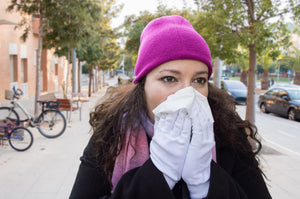Was your Mother Right? Can you catch a Cold from the Cold?
December 07, 2015

Remember when you were growing up and your mother bundled you up in layers of clothing when the weather got chilly? Even as you got older, your mom was probably still telling you to put another jacket on or you’d “catch a cold”.
Many people believe that the colder weather leaves them susceptible to catching the common cold. It certainly makes sense when you consider that most of us tend to cough and sneeze more during the winter months. Was mom right? Or is it another old wives tale?
Debunking the Myth
During the winter months, they say, as the weather gets colder, people spend more time indoors and are in much closer contact with one another. They’re all the more likely to pass their germs along. Well, maybe mom wasn’t entirely wrong though; scientists continue to search for an underlying relationship between cold weather and catching the rhinovirus or the common cold.
In order to test that theory, scientists studied people living in very frigid climates and those on expedition through the Canadian Rockies. Some scientists have even dunked people in cold water and made others sit naked in subfreezing temperatures. It’s mind boggling to think what people will do all in the name of science. Regardless, the findings were mixed, but they did document an increase in upper respiratory infections in competitive cross-country skiers who vigorously exercised in the cold.
However, it’s not clear if there were other factors that contributed such as the amount of exercise, the cold climate or the dryness of the air. Interestingly, they discovered that exposure to the cold increases the levels of some proteins and hormones known as cytokines, which act as messengers in the immune system, but it’s unclear how this affects our health.
Nevertheless, there are more incidents of upper respiratory illness during the colder months and while not all studies agree that the cold weather is responsible, there is evidence to suggest that inhaling cold air can lead to a response called vasoconstriction. This is where blood vessels close to the outside of the body, such as those found in the nose, close and narrow leading to dryness and adversely affecting the nose’s ability to filter out infections.
Immune Response and Temperature
Earlier this year, an exciting discovery from a team of scientists at Yale University found that the lower the temperature outside, the lower the body’s immune response. In other words, the rhinovirus thrives in the cold.
According to an article published at http://www.iflscience.com/healthandmedicine/canyoureallycatchcoldwhenitscoldout, up until now, the link between the human immune response and temperature hadn’t been well studied, so the team set out to see if, like the rhinovirus, our immune system is also sensitive to changes in our body’s temperature.
Testing cells that were taken from mice airways with a rodent version of the rhinovirus then incubating them at two different temperatures:
- 33 degrees Celsius, (91 degrees F) the temperature inside our nasal cavity
- 37 degrees Celsius (98.6 degrees F), the temperature inside our lungs
They discovered that there was a strong immune response and the virus slowed its replication at the higher temperature; whereas at the lower temperature, the immune system was weakened. So, maybe there was an inkling of truth to what mom said! What do you think?
Protecting our Immune System
We think a lot hinges on a healthy immune system. Generally speaking, our immune system works hard to protect us, and we have an obligation to help keep it strong. There are plenty of strategies when it comes to adopting a healthy lifestyle.
We need to eat right, get lots of rest and plenty of exercise, but most importantly, 70-80% of our immune system lies in our gut, so supplementing with a quality probiotic like Natren Healthy Trinity, is your first line of defense when it comes to keeping your immune system in tip-top shape. Still, we don’t recommend going out without a warm jacket when it’s chilly – Mom was probably right about that one!
The post Was your Mother Right? Can you catch a Cold from the Cold? appeared first on Natren Probiotics Blog.





Leave a comment